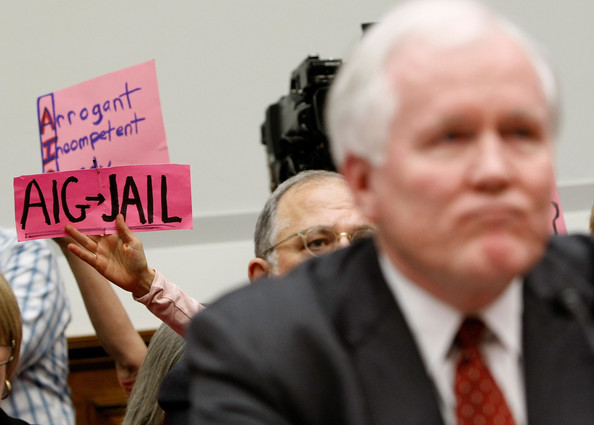AIG Bailout: CEO Edward Liddy Testifies Before House Oversight Committee (CNBC & Youtube Video; May 13)

Yesterday AIG CEO Ed Liddy made another well-rehearsed trek to Capitol Hill to deliver his face for Congressional dart games. The faux anger and populism was palpable even to the least cynical of viewers. The upshot was none too satisfying: AIG expects (hopes, dreams, prays) to reimburse the taxpayer fully within 3-5 years provided the economy doesn't weaken further. (Good luck with that small caveat.) The tally, last checked, was $182 billion from taxpayers out the door and exactly zilch having been returned thus far. Optimism still trades at a substantial premium to reality inside AIG.
Let's have a quick look at AIG's track record with forcasting and very slight penchant for optimism. In December of 2007, Joseph Cassano said it was difficult to imagine any scenario under which AIG would lose even 1 dollar on its CDS obligations. Nine short months later in September of '08, AIG said it needed $20 billion in capital to stave off bankruptcy. The next day Paulson and Treasury announced a $75 billion bailout of AIG to be re-paid within 12 months. Now 8 months and 3 iterations later, we are told the current $182 billion bailout might be re-paid in 3-5 years, IF the economy does not weaken substantially from here.
My question is simple: do they put Zoloft and Ecstasy in the food at AIG headquarters or do certain execs just use needles.
After the jump, we have video of Liddy's opening statement, the transcript, an Ohio-focused attack from Kucinich and a few related stories.
See also:
Liddy's opening statement to the House Government Oversight Committee (5:36).
House Republican Dan Fortenberry questions the AIG bailout (6:06).
Ohio Democrat Dennis Kucinich questions Liddy (5:47).
Liddy's testimony in PDF form.
Reuters recap of Liddy hearing.
From the AP:
The government-installed head of AIG told Congress Wednesday the insurance giant is selling many of its foreign assets to repay U.S. taxpayers, but lawmakers questioned whether the plan makes sense and demanded details.
American International Group Inc. Chief Executive Edward Liddy said the company has reduced, but not eliminated, the risk its failure could pose to the global economy despite getting more than $180 billion in federal bailout aid.
"The assurance I can give you is we will do everything we can to not require more federal money" but that will hinge on how long the worldwide recession drags on and the condition of the financial markets, Liddy said.
Liddy agreed to provide portions of AIG's "Project Destiny" restructuring plan to the House Oversight and Government Reform Committee, but said details are sensitive and could hurt the company's ability to sell assets.
"We will work with you to provide everything that we possibly can," Liddy told committee chairman Rep. Edolphus Towns, D-N.Y. Main Street Americans were angered over AIG's secrecy and its payment of millions in bonuses to employees, Towns said.
Congress needs "to understand what the long-range plan is for AIG," Towns said. He asked whether it made sense to sell off assets in a bear market where prices are depressed.
AIG on Monday announced plans to sell its Japanese headquarters to Nippon Life Insurance Co. for $1.2 billion in cash. The transaction is expected to close in the second quarter.
While AIG is working to divest assets, Liddy said, it doesn't intend to sell them at "fire-sale prices." The company plans to retain its U.S. property-casualty and foreign general insurance businesses, and a stake in its foreign life insurance operations.
"How long the plan will ultimately take will very much depend on how quickly and how strongly the global economy recovers," Liddy said. "Because we are all committed to ensuring that the mistakes of the past are not repeated, we must take the time and exercise the diligence to do this restructuring properly."
AIG was nearly destroyed last fall at the height of the financial crisis and became one in a string of corporate calamities and a touchstone for public outrage. The huge volume of credit default swaps - a form of insurance against bond defaults - sold by AIG, coupled with rising levels of defaulted mortgage and other debt, threatened the company's existence and prompted the government to step in.
Government aid to the company now totals $182.5 billion. The U.S. has taken a nearly 80 percent stake in New York-based AIG.
Liddy said the company has reduced its exposure to credit default swaps to $1.5 trillion, compared with the original amount of $2.7 trillion.
Also testifying at Wednesday's hearing were three trustees charged with overseeing the government's holding in AIG. They are seeking new board members for the company.
The $450 million in bonuses AIG paid to employees, including to traders in the financial products unit that brought it to the brink of collapse, fueled public and congressional outrage. The Democratic-led House approved a bill in March that would slap punishing taxes on big bonuses at AIG and other companies bailed out by taxpayers. The Senate didn't act on the plan, however.

 May 14, 2009 at 1:43 PM
May 14, 2009 at 1:43 PM
Reader Comments (5)